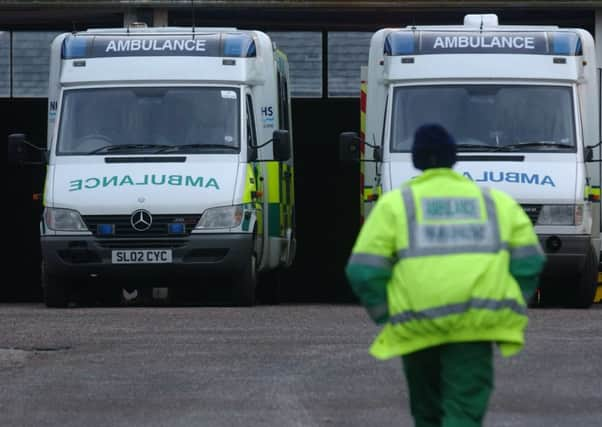Thousands of patients wait more than an hour for an ambulance


Nearly 2,000 patients with non life-threatening illnesses had to wait over 60 minutes for paramedics in the Lothians last year, with more anticipated around the country.
Health campaigners said the times taken were worrying while ambulance bosses said emergency calls including heart attacks were handled within six minutes on average. Ambulance chiefs today said that the figures should be seen within the context of nearly 80,000 calls, with only 2.4 per cent waiting over 60 minutes.
Advertisement
Hide AdAdvertisement
Hide AdHonorary chair of the Scottish Patients Association Margaret Watt said: “I can understand why there’s hours of delay.
“There shouldn’t be but that’s what happens when you’ve not got enough space in the emergency departments to take patients in.”
Ms Watt blamed insufficient A&E rooms causing a backlog, as paramedics are forced to wait with patients until they get signed in at hospital.
“It’s not the fault of the ambulance staff,” said Ms Watt.
“I think it’s a very precarious position because it’s not the fault of people phoning up having heart attacks or strokes either.”
She added: “The system needs to be looked at and ironed out.”
Paramedics took hours to respond to some non life-threatening calls – with one patient in the Craigentinny suburb of Edinburgh waiting nearly nine-and-a-half hours.
There were 15 call-outs over the last year where paramedics took longer than five hours to respond.
One patient with a potentially life-threatening condition waited for more than one hour.
Advertisement
Hide AdAdvertisement
Hide AdParamedics aim to reach such emergency calls within eight minutes while targets for non life-threatening calls were abolished last November.
Tory shadow health secretary Miles Briggs said the figures were “extremely concerning”.
“These may be statistics, but behind each one will be a patient who’ll have been caused immense distress,” said Mr Briggs.“When people need an ambulance, they generally expect to see it arrive promptly.”
Ambulance bosses said that they would train 1,000 new paramedics over the next five years to help cut response times.
A Scottish Ambulance spokeswoman said: “Patients with immediately life-threatening conditions, such as cardiac arrest, are prioritised and receive the fastest response.
“Latest figures for September show that we reached these patients on average within 5.44 minutes.
“In less urgent cases, our call handlers may spend more time with patients to better understand the patients health needs and ensure they are sent the most appropriate resource for their condition.
“In these cases, patients may not require to be taken to hospital because their condition is less serious and can be treated either within the home or by onward transportation to an alternative facility.”
Advertisement
Hide AdAdvertisement
Hide AdThe spokeswoman added: “We are moving towards focussing on improving patient outcomes rather than simply measuring the time it takes to respond.
“The statistics being quoted need to be seen within the wider context of nearly 80,000 total calls received by the Ambulance Service over this period, with only 2.4 per cent of these calls waiting over 60 minutes.”